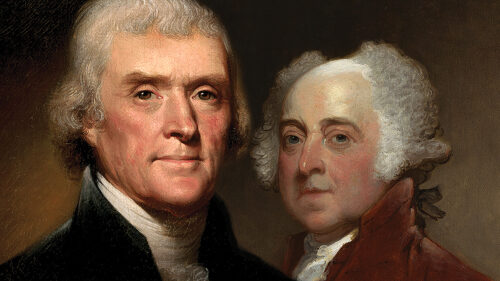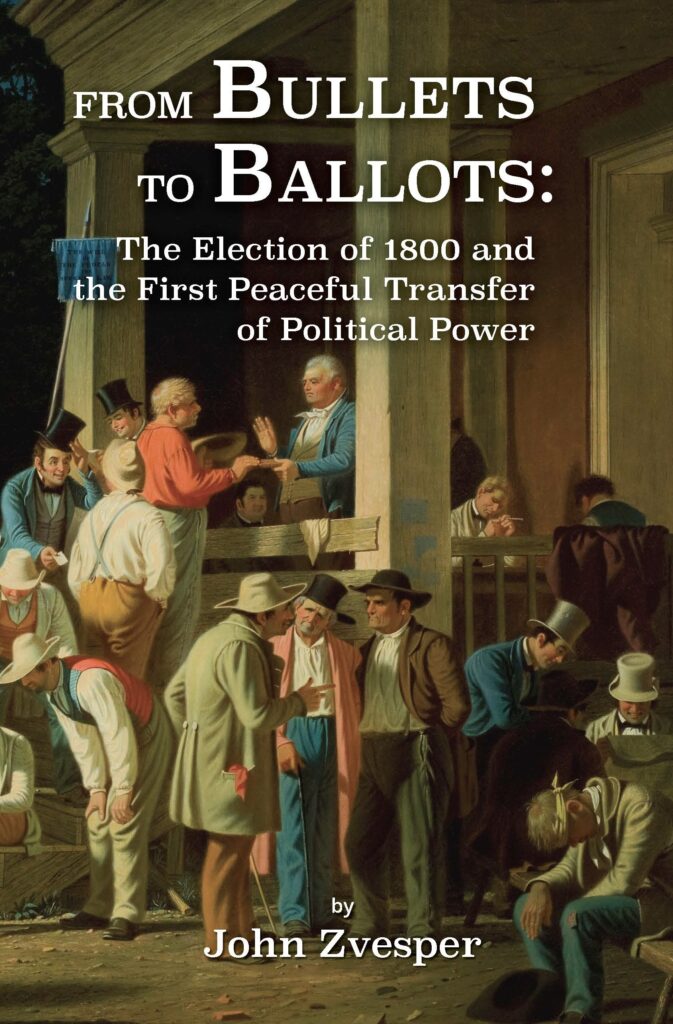
The Election of 1800
From Bullets to Ballots: The Election of 1800 and the First Peaceful Transfer of Political Power
by John Zvesper
“New democracies have to find their way towards attitudes, practices and institutional arrangements that complement free elections with a culture and a constitution of freedom.”

The American founding did not end with the ratification of the Constitution. The experience of political party making in the 1790s set into motion the regime created by the constitution making of the 1770s and 1780s. Americans can learn important things about their politics today by reflecting on the experience of the 1790s. If American political experience has lessons for other democracies, some of the most important of those lessons can be found here.
TeachingAmericanHistory is proud to present The Election of 1800 and the First Peaceful Transfer of Political Power in digital format, for use by teachers, students, and citizens as they seek to better understand the American Founding and the legacy it provided for successive generations.
Prologue
The lessons of the 1790s can be concisely summarized under four rubrics: partisan principles, public respectability, partisan vices, and individual statecraft.
Chronology
Chapter 1: First Principles
The first ever peaceful transition of power after bitterly contested popular elections fought by principled partisans occurred in America, in the “Revolution of 1800,” after elections that gave the Republican party led by Thomas Jefferson control over both the presidency and congress. Both the Republicans and their opponents, the Federalist party, believed that the fundamental principles of democracy were at stake in the conflict between the two parties.
Chapter 2: The Lessons of Constitution Making
In the new nation in the 1790s, it is particularly important to note the lesson about executive power that Americans were beginning to draw from their political experience in the 1770s and 1780s. Here we see them learning from their failures as well as from their successes.
Chapter 3: Anxious Confidence
The founders expected that parties of interest (“factions”) would emerge, but such parties would be involved in legislative deliberations only as “interested parties.” Parties of principle, on the other hand, were to be avoided altogether, for a number of reasons.
Chapter 4: Doubts and Disunity
If Federalism had offended only with its political elitism rather than also with its moral, social and economic project, the partisan conflict of the 1790s might well not have occurred, or at least might not have been so deep and bitter that it produced the beginnings of party government.
Chapter 5: The Republicans Organize
In 1791, Madison, Jefferson, and other soon-to-be leaders of the Republican party began to be much more disturbed about the direction of the government’s domestic policy under Hamilton’s influence. The interdependence of domestic and foreign policy, which Hamilton’s project was intensifying, meant that Hamilton as the principal domestic policy official and Jefferson as the principal foreign policy official had a choice. They either had to share many views, which they increasingly did not, or one had to let the other have his own way, which neither was prepared to do.
Chapter 6: The Republicans Persuade
The Revolution of 1800 was built on communication networks among those actually or potentially sympathetic to the Republicans’ revolutionary goals.
Chapter 7: Foreign Affairs Delay the Republican Victory
From 1793 to 1800, foreign policy disputes and their domestic repercussions erupted onto the scene even before the Republican-controlled House produced by the elections of 1792 convened. This eruption showed that the Republicans had to make a more sustained and more comprehensive partisan challenge to Federalist control of the federal government. The events of 1793-1800 had the effect of making this partisanship seem more necessary, even though these events also made both parties more deeply and bitterly opposed to each other.
Chapter 8: Suppression, Protest, and the Revolution of 1800
While the Republicans at the end of the 1790s were becoming wiser about international politics, the Federalists were becoming less wise about domestic politics. The Federalist party’s determination to triumph over domestic political opposition was so counterproductive that it can be seen as one of the main reasons for the Republican party’s triumph in the Revolution of 1800.
Chapter 9: The Conclusion – The Revolution of 1800 and Party Government
Electoral revolutions in democracies can be revolutions without swords, if they are about differences of partisan principles (however ideological), but not if they really are disputes about the superiority of the principles of democracy themselves.
